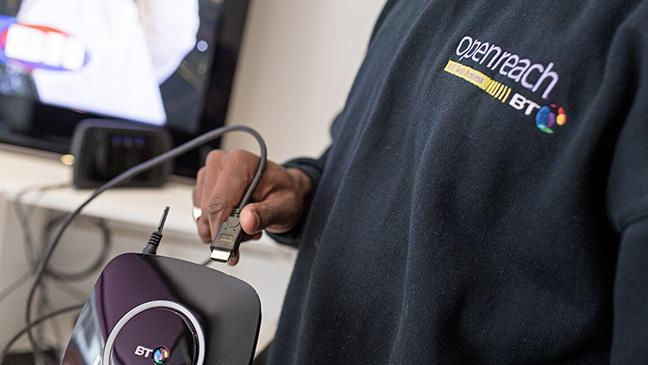by Jude D'Alesio
Labour has announced its plan to part-nationalise Britain’s largest telecoms provider. Boris Johnson dismissed it as a ‘crackpot’. Is there even a glimmer of hope in the plan?

“A new public service delivering the fastest broadband free to everyone is at the heart of Labour’s plans to transform the future of our economy and society,” said Labour leader Jeremy Corbyn, proposing that every household and business should have “free” ultrafast broadband by 2030.
This broadband upgrade would be achieved by a Labour government taking BT’s network arm, Openreach, into public ownership. A new state-owned entity, called British Broadband, would run the full-fibre network. Labour estimates that it would cost £20bn to build the network, adding to the woes of BT, the UK’s beleaguered telecoms champion.
The party calculates that it would cost £230m a year to maintain the plan, paid for by taxing multinationals. Perhaps the closest comparison would be with Australia’s state-run National Broadband Network, which also promises a high-speed connection to every home (though consumers must still pay private internet-service providers to connect to it). Its costs have risen from A$30bn in 2013 (then $29bn, and 1.9% of gdp) to A$51bn today, which is 2.6% of GDP. Critics call it a wasteful mess.
This article will explore the policy’s effect on BT itself, followed by the shockwaves it will send to the wider telecoms market, concluding with the plan’s financial feasibility.
What will happen to BT?
Carving Openreach out of BT would have a far-reaching effect on the company, which owns the UK’s biggest fixed-line telecoms network. As well as maintaining the network, Openreach charges BT’s rivals for enabling them to offer broadband services to consumers over its infrastructure. As such, Openreach is an important source of cash for BT and a key way through which the company pays dividends to shareholders and makes contributions to its large pension scheme. However, some of the groundwork has already been done to split Openreach from BT. Ofcom, the telecoms regulator, forced BT to establish Openreach as a legally separate entity to ensure fair treatment of industry rivals.
Could pensions be an expensive stumbling block to Labour’s ambitions? BT has the UK’s largest company pension scheme with £63bn of liabilities — three times the company’s £20bn market capitalisation — and a £5.5bn deficit. Nevertheless, compared with all the other issues, pensions are the easy bit in any nationalisation. Openreach would be sold to the government in exchange for cash or gilts. The pension scheme would stay with BT, which would pay all future deficit contributions, and the Crown guarantee would remain in place for all members. To compensate for the loss of Openreach, which is a major part of overall profit and cash flows, BT would make a one-off pension contribution from the sale proceeds. There are many examples of this, including Pearson selling the Financial Times to Nikkei in 2015, and Invensys, the engineering group, selling its rail division in 2013.
A ‘free’ market?
Several companies, such as Virgin Media, Sky and TalkTalk, have invested in their own networks. There are about 300 other internet service providers in the UK that would be unlikely to be able to compete with a free broadband service.
As Sir Bryan Carsberg, Former Director General of Telecommunications, said, the most important development after BT’s privatisation by the Thatcher government was the encouragement of competition. This was conducive to taking advantage of technological developments as soon as possible. A monopolist can afford to take its time over introducing new technologies; a business facing competition cannot risk undue delay. Competition has enabled the UK to have the vibrant telecoms market we have today. But competition cannot thrive between private businesses and state-owned businesses. Renationalisation of BT would almost certainly lead to our losing the good performance of a large part of our telecoms industry.
The party is also proposing a unilateral tax on multinational companies’ profits, based on their sales in the UK. This is in line with international efforts to reform longstanding rules that have notably allowed technology companies such as Amazon, Apple and Facebook to shift profits around the world to minimise their tax bills. Were a Labour government to impose such a tax before any international agreement, it would be almost certain to face trade retaliation from the US and similar taxes on UK multinationals imposed by other countries.
Feasibility?
Some telecoms industry insiders are sceptical of the plan. The National Infrastructure Commission, a government advisory body on infrastructure, last year put the cost of such a network at £33bn, far from the party’s proposal of £20bn.
A radical Labour government likely requires an overall majority. It’s a slim to no hope prospect. Raising private capital in the future could also prove difficult, because investors would be very wary in case of future nationalisation. BT is in the top 20 of most held shares on Hargreaves Lansdown, but the policy will make the UK a no-go area for capital.
The likelihood is that we will not see this plan in the foreseeable future, with the Conservatives set for an overall majority. One thing may be clear, however, which is that investors would spend the whole of Corbyn’s premiership on the very edge of their seats.
Comments